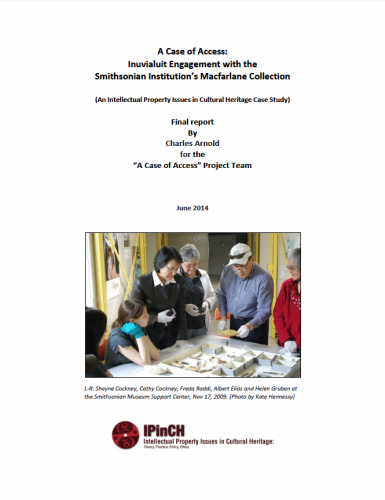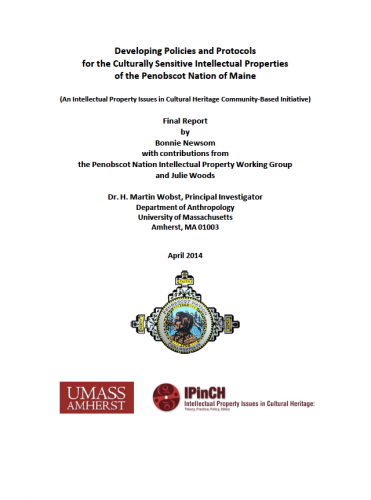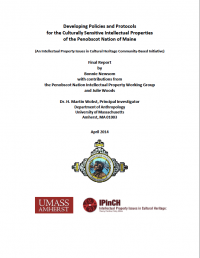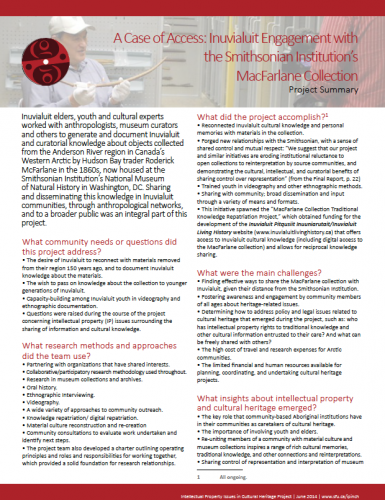We are pleased to announce that the final reports from two IPinCH-supported projects are now accessible online. These are the first of the long-anticipated series of Community-Based Initiative (CBI) reports to be completed and shared by IPinCH team members. Each is accompanied by a two-page project summary.
The final reports are a very rich source of unique information on community values related to the tangible and intangible aspects of heritage (and much else!). They describe the intellectual property and cultural heritage challenges (and opportunities) faced by particular communities, document the research process and results obtained, and provide important insights about the value of community-based research. The information offered by each team also reveals what works well (and what does not) in research that is focused on community needs and benefits, but which is also situated within an academic context (from where funding flows). In addition to the obvious value to the IPinCH team, these reports offer information that will be useful to researchers, policy makers, and others looking for examples of successful alternative approaches and solutions in both theory and practice relating to intellectual property.
The project summaries draw out key aspects of the project, organized around a series of questions, including: What community needs or questions did the project address? What approaches did the team take? What insights or lessons about IP and cultural heritage emerged from the project? and What lessons about good practice came out of this project?
The experiences of the CBI teams may be invaluable to scholars, Indigenous organizations, and others engaged with related issues, and we encourage you to share these reports and summaries widely within your networks.
Many other IPinCH-supported CBIs are now completed, or soon will be, and a number of report drafts are now in the review or editing stage. We will be will posting additional final reports and project summaries as they become available.
 In A Case of Access: Inuvialuit Engagement with the Smithsonian’s MacFarlane Collection, Inuvialuit elders, youth and cultural experts worked with anthropologists, museum curators and others to generate and document Inuvialuit and curatorial knowledge about objects collected from the Anderson River region in Canada’s Western Arctic by Hudson Bay trader Roderick McFarlane in the 1860s, now housed at the Smithsonian Institution’s National Museum of Natural History in Washington, DC. Sharing and disseminating this knowledge in Inuvialuit communities, through anthropological networks, and to a broader public was an integral part of this project.
In A Case of Access: Inuvialuit Engagement with the Smithsonian’s MacFarlane Collection, Inuvialuit elders, youth and cultural experts worked with anthropologists, museum curators and others to generate and document Inuvialuit and curatorial knowledge about objects collected from the Anderson River region in Canada’s Western Arctic by Hudson Bay trader Roderick McFarlane in the 1860s, now housed at the Smithsonian Institution’s National Museum of Natural History in Washington, DC. Sharing and disseminating this knowledge in Inuvialuit communities, through anthropological networks, and to a broader public was an integral part of this project.
View the final project report >
 For the project Developing Policies and Protocols for the Culturally Sensitive Intellectual Properties of the Penobscot Nation of Maine, the Penobscot Indian Nation (Maine, USA), with support from partners at the University of Massachusetts-Amherst, developed tribal protocols, tools, and organizational structures to address intellectual property issues related to archaeology and heritage-based places.
For the project Developing Policies and Protocols for the Culturally Sensitive Intellectual Properties of the Penobscot Nation of Maine, the Penobscot Indian Nation (Maine, USA), with support from partners at the University of Massachusetts-Amherst, developed tribal protocols, tools, and organizational structures to address intellectual property issues related to archaeology and heritage-based places.
View the final project report >







